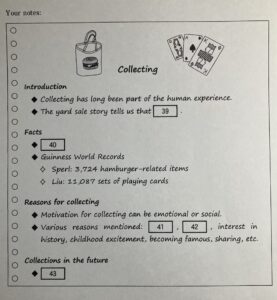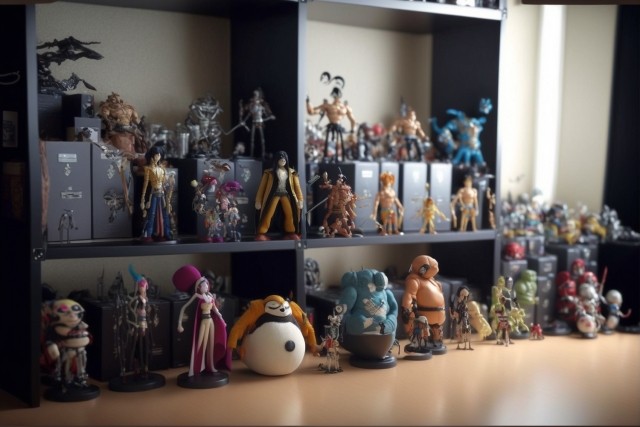今回は、第5問 を終えて
第6問 A に入ります。
基本的な問題の扱い方
今回、このブログでは、
共通テスト(英語)の「リーディング」の問題だけを扱うこととします。
基本的な問題の扱い方は、下記の通りにします。
①問題の提示
※基本的には「大問」毎に扱う予定ですが、問題の量などによりそれより細かく区切って取り扱うこともあります。
②模範解答の提示
③解説
④そのほかの補説
第6問A:配点12点 ▶︎各3点(4問)
それでは、第6問 A の問題を見ていきましょう。
A You are in a discussion group in school. You have been asked to suumarize
the following article. You will speak about it, using only notes.
Collecting
Collecting has existed at all levels of society, across cultures and age
groups since early times. Museums are proof that things have been collected,
saved, and passed down for future generations. There are various reasons for
starting a collection. For example, Ms. A enjoys going to yard sales every
Saturday morning with her children. At yard sales, people sell unwanted
things in front of their houses. One day, while looking for antique dishes. an
unusual painting caught her eye and she bought it for only a few dollars. Over
time, she found similar pieces that left an impression on her, and she now has
a modest collection of artwork, some of which may be worth more than she
paid. One person’s trash can be another person’s treasure. Regardless of how
someone’s collection was started, it is human nature to collect things.
In 1988, researchers Brenda Danet and Tamar Katriel analyzed 80 years
of studies on children under the age of 10, and found that about 90% collected
something. This shows us that people like to gather things from an early age.
Even after becoming adults, people continue collecting staff. Researchers in
the field generally agree that approximately one third of adults maintain this
behavior. Why is this? The primary explanation is related to emotions. Some
save greeting cards from friends and family, dried flowers from special events,
seashells from a day at the beach, old photos, and so on. For others, their
collection is a connection to their youth. They may have baseball cards, comic
books, dolls, or miniature cars that they have kept since they were small.
Others have an attachment to history; they seek and hold onto historical
documents, signed letters and autographs from famous people, and so forth.
For some individuals there is a social reason. People collect things such as
pins to share, show, and even trade, making new friends this way. Others, like
some holders of Guinness World Records, appreciate the fame they achieve for
their unique collection. Cards, stickers, stamps, coins, and toys have topped
unexpected. In September 2014, Guinness World Records recognized Harry
Sperl, of Germany, for having the largest hamburger-related collection in the
world, with 3,724 items; from T-shirts to pillows to dog toys, Sperl’s room is
filled with all things “hamburger.” Similarly, Liu Fuchang, of China, is a
collector of playing cards. He has 11.087 different sets.
Perhaps the easiest motivation to understand is pleasure. Some people
start collections for pure enjoyment. They may purchase and put up paintings
just to gaze at frequently, or they may collect audio recordings and old-
fashioned vinyl records to enjoy listening to their favorite music. This type of
collector is unlikely to be very interested in the monetary value of their
treasured music, while others collect objects specifically as an investment.
While it is possible to download certain classic games for free, having the
same game unopened in its original packaging, in “mint condition,” can make
the game worth a lot. Owning various valuable “collector’s items” could ensure
some financial security.
Tis behavior of collecting things will definitely continue into the distant
future. Although the reasons why people keep things will likely remain the
same, advances in technology will have an influence on collections. As
technology can remove physical constraints, it is now possible for an individual
to have vast digital libraries of music and art that would have been
unimaginable 30 years ago. It is unclear, though, what
technology will have on collections. Can you even imagine the form and scale
that the next generation’s collections will take?

問1 Choose the best option for【 39 】.
① a great place for people to sell things to collectors at a high price is a
year sale
② people can evaluate items incorrectly and end up paying too much
money for junk
③ something not important to one person may be of value to someone else
④ things once collected and thrown in another person’s yard may be
valuable to others
問2 Choose the best option for【 40 】.
① About two thirds of children do not collect ordinary things.
② Almost one third of adults start collecting things for pleasure.
③ Approximately 10% of kids have collections similar to their friends.
④ Roughly 30% of people keep collecting into adulthood.
問3 Choose the best option for【 41 】and 【 42 】.
(The order does not matter.)
① desire to advance technology
② fear of missing unexpected opportunities
③ filling a sense of emptiness
④ reminder of precious events
⑤ reusing objects for the future
⑥ seeking some sort of profit
問4 Choose the two best options for【 43 】.
① Collections will likely continue to change in size and shape.
② Collectors of mint-condition games will have more digital copies of them.
③ People who have lost their passion for collecting will start again.
④ Reasons for collecting will change because of advances in technology.
![]()
👉模範解答と解説は次のページです。



コメント